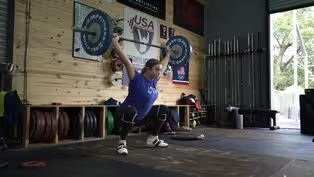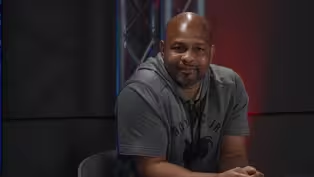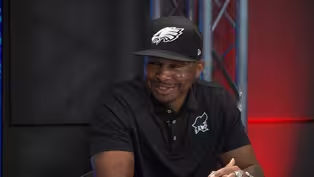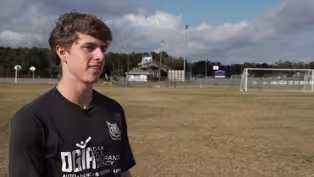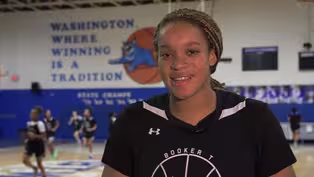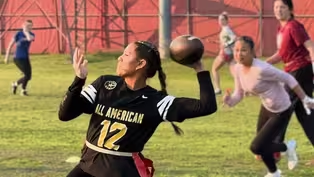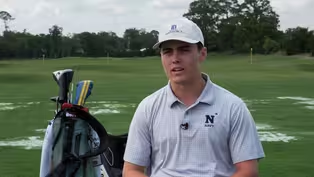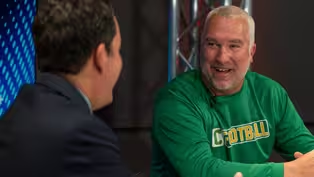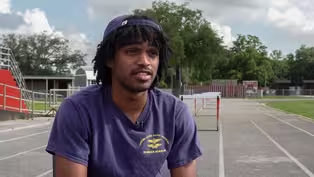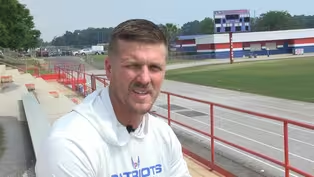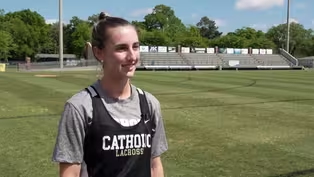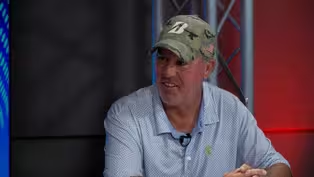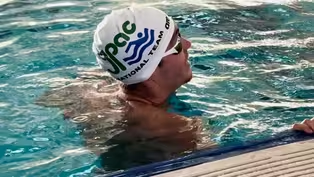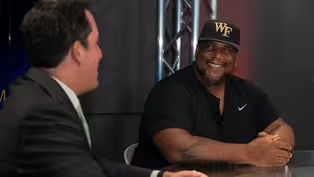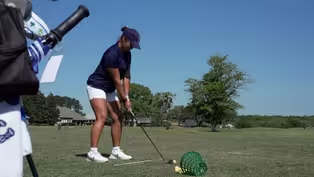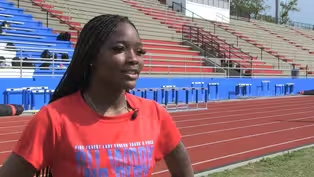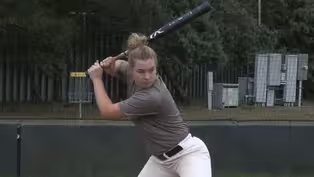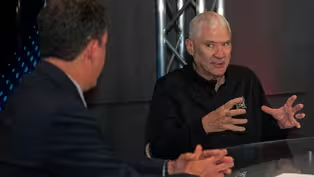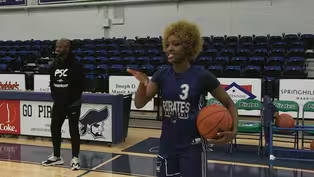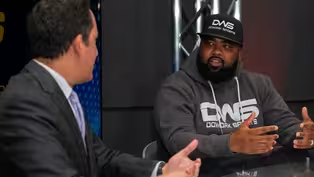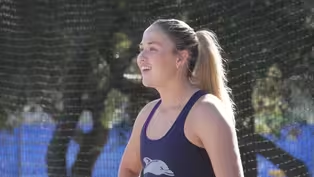
Going Deep-Roy Jones Jr.
Clip: Season 2025 | 14m 46sVideo has Closed Captions
Area legend Roy Jones Junior, is in the house to share insights on his hall-of-fame boxing career.
Area legend Roy Jones Junior, is in the house to share insights on his hall-of-fame boxing career.
Problems playing video? | Closed Captioning Feedback
Problems playing video? | Closed Captioning Feedback
Sports Spotlight with Steve Nissim is a local public television program presented by WSRE PBS

Going Deep-Roy Jones Jr.
Clip: Season 2025 | 14m 46sVideo has Closed Captions
Area legend Roy Jones Junior, is in the house to share insights on his hall-of-fame boxing career.
Problems playing video? | Closed Captioning Feedback
How to Watch Sports Spotlight with Steve Nissim
Sports Spotlight with Steve Nissim is available to stream on pbs.org and the free PBS App, available on iPhone, Apple TV, Android TV, Android smartphones, Amazon Fire TV, Amazon Fire Tablet, Roku, Samsung Smart TV, and Vizio.
Providing Support for PBS.org
Learn Moreabout PBS online sponsorshipWe'll go deep with Pensacola sports royalty Roy Jones Jr is in the house.
An International Boxing Hall of Famer and Olympic medalist.
He held world championship titles in four different weight classes.
Roy was the best pound for pound boxer in the sport for over a decade, and is regarded as one of the best to ever lace up the gloves.
Roy, thank you so much for joining us.
Thank you for having me, Steve.
So we'll go back to the beginning.
When you were a youngster, you were trained initially by your dad, Roy Senior.
Big Roy.
And you've talked about it before.
It's well known he was extremely tough on you.
How difficult was that to go through?
And how much did that make you, the fighter that you became?
It was it was difficult to go through, but it did turn me into the guy that I grew up to be turned into.
The man that I grew up to be turning into, the fighter that I grew up to be.
So it was tough, but it was a sacrifice where you got to sacrifice something if you want to be great.
So we had to sacrifice that, and that became great.
You go to the Olympics in 1988 and, South Korea, you dominate, get to the gold medal match.
You dominate that fight against the South Korean fighter.
But corrupt judges, give him the decision.
It's one of the biggest travesties in Olympic history.
You had to settle for the silver.
How did that affect you at the time?
At the time, it affected me pretty rough when it happened.
I thought it's the worst thing that ever happened to me.
But by the time I got home, I realized that it probably was the best thing that ever could have happened to me.
For two reasons.
Number one, it gave me notoriety that the gold medal would not have given me, made people feel for me, have loved me that didn't know me because of what had just happened to me on world TV.
Second, it turned into a fire inside of me to prove that I was the best fighter because they gave me the power block, a club which is for the best fighter at the Olympics.
Given the best fighter.
I told them, because that means I'm the best amateur fighter in the world.
Because the Olympics is the biggest amateur stage.
By giving me that now, I feel like y'all give me the best boxer at a time in which I'll give me a silver medal.
So now judges made Me do is based by the grace of God.
Y'all made me decide to go back home and show the world that.
That not only am I the greatest fighter in the Olympics, but I'm the best fighter in the world right now.
And that's what I did.
Yeah, you're early on.
You turned pro in.
A lot of your early fights were in Pensacola, and, the hometown gave you a lot of love.
Came out a lot of support.
You know, early on in your career, how much that that support from Pensacola mean to you?
The support in Pensacola really started for me when I got home from the Olympics.
When I came home that Pensacola airport was full of Pensacola supporters, I thought I had failed, I thought I had let everybody down.
The airport was full of Pensacola supporters, had some mobile people to gaff mobile, bought me a gold medal.
So like when seeing how this community gathered around, support me at one of the most difficult times of my career.
That's why people always say, why you?
Why you always say Pensacola now?
Because when I was at my lowest, Pensacola was there for me.
So there you go.
On to win your first, world title, 1993, over Bernard Hopkins.
You know, what did that achievement at the time mean to you?
To know you become a world champ?
Yeah.
As, as you become a world champion.
It's like that's your first dream as a professional fighter.
Once you, my first goal was to go to the Olympics and get a gold medal.
Got to Olympics?
They cheated me out of global.
Your second goal, if you said to a pro is become a world champion.
So that was my mission.
That was my next goal.
And when I beat him, that was another check checked off.
It's on to the next now.
So that was the middleweight title a year later, 1994 you fight James Toney for the super middleweight title.
James Toney at that time was considered the best pound for pound.
And you were the underdog.
Yeah.
In that fight.
Yeah.
Yet you dominated the fight.
Yeah.
What gave you the confidence that you could do that?
Well, he was the best fighter pound for pound.
What?
I was the best fighter for real.
Because he didn't make it to the Olympic trials or to Olympics.
He turned pro.
He did a lot of good things.
The profile that he became one of the best fighters to ever fight.
Two, because he's definitely in the Hall of Fame now.
But at that time, I wasn't seeking to destroy mission.
You know, you gotta remember I got robbed the gold at a dollar because of a gold medal.
Now, I had to separate from my father, who was too overbearing for me to become a real man and become a real world champion.
So I can't look back.
So when I see him and my father, I had denied the fight one time.
I found it out shortly after he denied and I told him, if you ever get a family, get up to him to fight him again.
I'm fine now.
So when it came back then I took it.
But what he didn't realize was when he watched me fight on TV a few months later.
When he would fight, I would see him do things that I did well, he I watched him fight.
I never copied anything that he did.
So if you copy me, what they tell you, you don't think you're better than me.
You know I'm better than you or you wouldn't be gotten me, right?
Yeah.
You got a better record?
Yeah.
More people know you because you got to be champion for I did.
And then you went on to become super middleweight champion.
But you're copying me.
If you copy me, you don't think you're better than me.
I would know that.
So, yeah.
And you proved it.
So you and you went a decade, really being the best pound for pound in the world.
You were pretty much untouchable in that, in that stretch, you just dominating fight after fight.
What was it like to be in that stretch?
How invincible did you feel when that was going on?
I can't say I was feeling invincible.
I just knew what God had for you.
Nobody could take away from you and what God has going for you.
Do you have to do those things?
Sometimes to go out a little on and you probably should, but that when God put it in you like that, it's hard to just take it out.
So for me, I felt like, could nobody beat me because I knew too much?
All the hard, rough days I had in my day, I learned a lot.
And then when I got with my dad, I learned even a lot more.
So about to compound God's lessons on top of what my dad taught me, made me an incredibly hard to be guy and in my prime had not moved up to heavyweight.
I may have never lost, but at the same time, he did not give me the disqualification loss to the game.
As a pro then, I may have never taken the chance to go to him where I probably would just be like you, but I got to do what I say, okay, I'm undefeated.
Stuff, but because they gave me that loss, it kept me day.
God knows how to motivate us better than we know how to motivate ourselves.
Though losses like the Olympic loss only motivated me more, made me push to go even harder.
So when were you going through that?
When you were best pound for pound did you?
Is sometimes when you're in it, it's hard to really enjoy it or really realize it when you're doing it.
Did you enjoy?
Did you realize what you were, what level you were at?
I told you enjoyed it, and I totally realized exactly why I was.
It because everybody want me is like this.
I used to tell people, I say, listen, everybody down here is in a race to be number one, right?
But when you get to be number one, all those guys that were around you before ten, have you be no more than they all look at.
They all chasing after you because you are a target now.
So I knew this.
So when I beat James, I knew I was going to become the target.
All I could think about that was that the target wouldn't be so easy to hit, but they thought it would be.
So that's why I was able to dominate for so long.
So you talked about the heavyweight titles in 2003.
You move up to to try to win the heavyweight title.
You know, it was a risk to do that.
You fight John Ruiz Jr, very strong heavyweight at Las Vegas.
And you won.
You want you being the first former middleweight champ to become heavyweight champion 106 years.
You know how significant how amazing was that to you to be able to pull that off.
It was amazing me to be able to put it off.
But what people didn't understand about the whole situation was before I fought him.
I went to Atlanta, Georgia and sat down with Jim Thomas and Evander Holyfield.
Jim Thomas was even as loyal as event of the Fight me for the heavyweight title because he was the champ.
He said, no, I see it.
Why is I gotten in the way if they lose and then win?
But it's the most money you can make fighting anybody out right now.
No, I don't want to do it.
Okay.
Forget it.
I love when I love, I want here to get ready to fight.
Clint Lewis Joe beat event hold of you at Jerry.
Say I'll fight words.
I'll say you do what?
You understand me?
So what God has for you know, better stuff.
And it's like I will try to pick who I fought.
I want to whoever Evander was, a smaller heavyweight is.
Of course I want him first.
But when Joe beat him, I said, well, I got to say whoever there.
So if he said he'll fight me this go.
And that's what happened.
So, so what was so unique about you?
I was 106 years without someone doing this.
What was so unique about you that you could do this?
All the grace of God made me do it.
But I knew when God did certain things to me in my career, he would do thing to push me hard, you know?
So I remember sitting at home one day and I saw Benoit Hopkins break the record for the most middleweight defenses of all time.
But that's one week.
But I couldn't do it.
I was going too much.
You understand me?
I can't stand middleweight, so.
But what can I do to make history?
All I can make history and do what can't nobody else do for anybody did in 106 years.
Why?
Because that's very difficult to do that even with today's aid.
Aidan.
Tab, it's going to be another 260 years for you to do it again.
So for me to see that challenge to, hey, it's been over 106 years as opposed to one and middleweight like if and have we built if anybody can do it who you think it might be.
So when the opportunity came about actually actually I had a dream about it first who I thought had a dream.
I woke up next day in the rain to go see even older, because I wanted to put that dream into action.
He said no, I said yes, that's what it was.
So you make history.
After that, you had some potential to maybe fight more heavyweight.
You ended up going back down to light heavyweight and the toll on your body.
You know, took a toll, and you ended up having your first loss to Antonio Tarver in 2004.
How devastating was that first real loss?
How devastating was that to you?
Oh, devastating because I didn't I did realize that it's like like I told you before, my life has always been about sacrifice and saving.
That's why would you question whether you were somebody you would ever.
You have to be.
It's hard not to be to God.
Story about how Jesus sacrifice, the sacrifice happens along your whole life a lot of different ways.
So I realized that to go up and do something that nobody ever did, you have to sacrifice something which is probably my body.
But before I let that take me over, by the grace of God, I still had the willpower to go in and beat too hard for the first time to re regain the light heavyweight title again, like I told Fitzsimmons, I did.
That's not what Fitzsimmons did.
What?
I found out that he won a middleweight title.
He won the heavyweight title.
Then he won my heavyweight title.
So I thought he won middleweight, light heavyweight, heavyweight, recaptured light heavyweight.
So I'll do what I thought he had the he didn't do that, but I did anyway because I thought that's what happens all the first time.
I can't beat that.
I beat up me after that and it was like I said, my body was taking a toll on me because 25 pounds of muscle at 34 years old, I put on 25 pounds a month.
At 35 years though, they I took the 25 pounds a month off at third party though that was pretty tough on me.
So.
But they found out what kind of heart I had because in that first fight I had no energy.
I had no nothing.
I wasn't up for a one thing or two thing, my faith in God.
And that right there, that's it, I remember that.
But then after that, you know, age took a little bit of a toll on you and things to call.
Yet he had a stretch there where you were maybe past your prime, kept fighting, and you had some fights where there were tough fights.
You took some punishment.
And any regrets that you kept pushing.
You kept fighting after you were kind of past your time.
I can't say I really had no regrets because that's just who I am.
It would be a small step after you beat tall for that light heavyweight title.
It means more to just say, okay, I'm done.
I'm retired.
But it's like, can I live like that?
No, I came in.
I can't live knowing there is somebody over there that they think, give me a problem.
I got to go say, you understand me?
So was like, God bless him.
But I would made to do it for me, with the for me, with want me to do what I did.
Floyd waited on Pacquiao for five years.
I couldn't sleep the night knowing that the guy, the quarterback that they think of beat me.
I can't sleep at night.
Like I'm just different.
So it's like, I'm not saying what he did is wrong.
What he did is cool because that works for him.
That's all I can say.
I would have liked to have stopped after that first fight and call it a day, but I couldn't live like that because people would say, well, you see the fight?
I'm gonna get a fight.
No, but I didn't get right now what a muscular what it's like, you know, this is where I want to be known as a to ducking does no matter so.
So through it all, you always kept Pensacola first.
When I say that.
Not just saying Pensacola in the house when we covered your fights, these big fights.
You have room full of national media.
After the fight, you always did interview with channel three, where I covered your fights.
Always did one on ones when I was first before you went to the National.
And the best example of this is the Ruiz fight in Vegas when you won the heavyweight title.
My videographer that was out there with me, Marcus Moore.
As you know, you went to high school with.
He had appendicitis.
The night before.
He wasn't there.
I had no videographer.
So I'm after the fight over, you win the title.
I'm trying to find a way to get this one on one shot.
And we're in a big, giant room filled with national, international media.
I find that, local affiliate shooting on the same format we did.
I went up to him and I said, hey, if I can get a one on one with Roy where you guys shoot it, and you guys can use it, too, and they're like, you're going to get a one on one with Roy.
All these people, this international media.
And he said, yeah, fine.
Yeah.
If you, you know if you get it we'll do it.
Sure enough a press conference and I'm trying to get to you.
I see your bill, your buddy Bill, I tell him what happened and he looks up across the room.
He yells, hey, Roy, Pensacola!
Boom!
You came through a sea of people, by the way, and did the interview right away.
And then there's nothing to do with me.
That's because of your loyalty to Pensacola.
Exactly.
Why?
Why have you always been so loyal to Pensacola?
Because, like I tell you, when I came from the Olympics, I was really, really down.
Who was there to kiss my back and kiss my feet and make sure I stay above the ground?
Pensacola.
I didn't know all those people going to be at the airport.
I got there when I got to the what was it with people?
I couldn't walk to the elevator to the airport.
They had to came in through the airport to get to the cars.
That that's how many people were there that that was like a time of the and they say a friend and a friend in need is a friend.
Indeed.
I definitely needed a friend that was called became my friend that night.
Do you, you know, now that you're retired from from fighting, do you, do you miss the big stage or are you at peace with it?
I don't miss the big stage.
I'm always at peace with it.
But you got to remember that same door is inside of me.
There is no this big state.
That door.
Don't go of opportunity came.
The dog won't bite.
All right, well, we'll look out for that.
Right.
Thank you so much for your time.
Thank you.
thank you.
Video has Closed Captions
Clip: S2025 | 4m | A meteoric rise in weightlifting for Navarre's Izzy Zach brings big accomplishments and decisions. (4m)
Video has Closed Captions
Clip: S2025 | 14m 46s | Area legend Roy Jones Junior, is in the house to share insights on his hall-of-fame boxing career. (14m 46s)
Video has Closed Captions
Clip: S2025 | 13m 17s | Pensacola’s Adron Chambers reflects on his incredible journey to become a World Series Champion. (13m 17s)
Felipe Lawall-father/son combo
Video has Closed Captions
Clip: S2025 | 4m 18s | Coach Felipe Lawall and his namesake son are making the most of a shared passion for soccer. (4m 18s)
Video has Closed Captions
Clip: S2025 | 4m 9s | Booker T Washington hoops star Chamiah Francis has grown into one of the nation's top prospects. (4m 9s)
Video has Closed Captions
Clip: S2025 | 4m 46s | Youthful curiosity turned to maximizing new possibilities in Flag Football for Pace’s Amaya Pablo. (4m 46s)
Video has Closed Captions
Clip: Ep7 | 4m 50s | Catholic High School golfer makes the most of opportunities to fulfill a remarkable family legacy. (4m 50s)
Video has Closed Captions
Clip: Ep7 | 12m 39s | One of Pensacola's top high school football coaches reflects on his memorable career. (12m 39s)
Video has Closed Captions
Clip: Ep7 | 5m 48s | West Florida Tech Track & Field sensation reaches new heights with mind-blowing achievements. (5m 48s)
Video has Closed Captions
Clip: Ep6 | 5m 13s | A well-deserved succession from father to son for Pace High Football. (5m 13s)
Video has Closed Captions
Clip: Ep6 | 5m 4s | How lacrosse trailblazer Julia Frosch is making a family of high achievers proud. (5m 4s)
Video has Closed Captions
Clip: Ep6 | 13m 8s | Boo Weekley shares stories from his remarkable PGA career. (13m 8s)
Video has Closed Captions
Clip: Ep5 | 4m 25s | Pensacola swimming phenom Ian Malone uses different motivations to produce stunning results. (4m 25s)
Video has Closed Captions
Clip: Ep5 | 13m 1s | Pensacola native and Super Bowl Champ reflects on NFL career and how he's mentoring future stars. (13m 1s)
Video has Closed Captions
Clip: Ep5 | 5m 32s | UWF/Niceville golfer Alia Scotka is a model of dedication, poise, and all-around excellence. (5m 32s)
Video has Closed Captions
Clip: Ep4 | 4m 47s | Pine Forest High track star elevating on many levels to make the most of her incredible talent. (4m 47s)
PSC Softball - Australian Connection
Video has Closed Captions
Clip: Ep4 | 3m 49s | Pensacola State College has become a far-off 2nd home for many Australian softball players. (3m 49s)
Video has Closed Captions
Clip: Ep4 | 14m 16s | Pensacola State Hoops Boss Pete Pena is still going strong after nearly five decades in coaching. (14m 16s)
Video has Closed Captions
Clip: Ep3 | 3m 40s | Crestview's Katiya Casey is living up to impressive family history for Pensacola St. Basketball. (3m 40s)
Video has Closed Captions
Clip: Ep3 | 14m 44s | Donte Sheppard explains how DoWork Sports inspires student-athletes to maximize their potential. (14m 44s)
Video has Closed Captions
Clip: Ep3 | 4m 47s | Gulf Breeze High's Bella Satterwhite is reaching remarkable heights in beach volleyball. (4m 47s)
Providing Support for PBS.org
Learn Moreabout PBS online sponsorship
- News and Public Affairs

Top journalists deliver compelling original analysis of the hour's headlines.

- News and Public Affairs

FRONTLINE is investigative journalism that questions, explains and changes our world.












Support for PBS provided by:
Sports Spotlight with Steve Nissim is a local public television program presented by WSRE PBS
